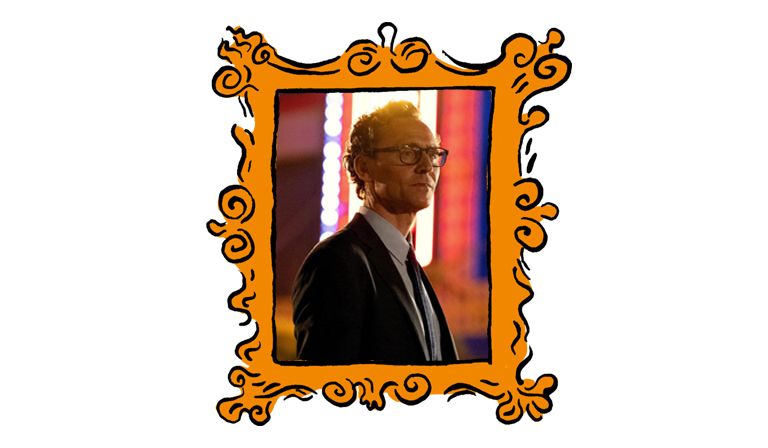“Even as the world falls apart, there’s still time for one last dance,” insists Nick Offerman’s narrator in the latest Stephen King adaptation, Life of Chuck, which comes to cinemas this week. It’s one of countless schmaltzy lines in a film that tries desperately to convince viewers that there is joy to be found even when the apocalypse is nigh.
Following the trajectory of one man’s life but in reverse, director Mike Flanagan’s feature begins at the end, with Chuck (Tom Hiddleston) on his deathbed. The entire universe is on the brink of collapse, chunks of California spontaneously splintering off from the mainland, enormous sinkholes swallowing suburban districts, communications going dark. Yet, despite these potentially unnerving goings-on, the film allows little room for dread. Characters clock in for work, visit friends or attend parents’ evening as usual, except now with cornier dialogue and more pensive gazing into the sky. Meanwhile, marriage and divorce rates are rocketing, as doomsayers rush to tie the knot, abandoning their spouses in favour of childhood sweethearts or reuniting with exes, all so they have someone to cosy up to while watching the stars being extinguished.
Flanagan’s attempted feel-good spin on the apocalypse might seem a rogue approach to its subject matter—although it actually belongs to a trend. A string of other sci-fis are taking premises that once would have been fodder for dystopia and slathering on the sappiness.
Take the upcoming Apple TV romcom with a futuristic edge, All of You, which deals with the separation of Brett Goldstein’s and Imogen Poots’s lovelorn characters after Poots takes a test that matches her with her soulmate (who is, unfortunately, not him); co-writers Goldstein and William Bridges (who also directs) are much more interested in the stickily emotional aftermath of the couple’s parting than in the broader implications of the test itself. Christos Nikou’s Fingernails (2023) similarly lacked any real concern about its science-based experiment to determine whether people are in love.
Both films are set in what appears to be an alternative present or recent past and have a benign, lightly funny tone, making them indistinguishable from other contemporary romcoms. Unlike sci-fis about dating services that preceded them—The One (2021), Soulmates (2020), Black Mirror’s “Hang the DJ” episode (2017)—there is nothing nefarious here about their newfangled technologies.
Another strand of sentimental sci-fi explores the potential of technology to help with grief. In Another End (2024, still awaiting release in the UK), Sal (Gael García Bernal) responds to the death of his partner in a car crash by trying out a service that allows mourners to “resuscitate” their loved ones in someone else’s body. Director Piero Messina takes this premise into romcom territory, as Sal inevitably falls for the person playing host to his deceased partner’s consciousness. Despite the weirdness of this situation, the story finishes with Sal clinching his happily-ever-after. Likewise, in the contrived tear-jerker Swan Song (2021), technology is used to ease a family’s sorrow, as Mahershala Ali decides to clone himself to spare his wife and kids the pain of his passing. In Daniela Forever (2024), a man takes a shady Belgian pill to lucid-dream his deceased girlfriend back to life—enabling him to plunge ever deeper into a fantasy version of his life with her.
In sci-fi’s soft-centred new turn, the threat traditionally posed by technology is neutralised—the implication, if there is one, being that people are the problem. This overrides one of the foundational assertions of science fiction since the 19th century. We can trace a line from William Henry Rhodes’s 1872 book The Case of Summerfield (which predicted the development of weapons of mass destruction) to Jean-Luc Godard’s 1965 film Alphaville (which posited technology as the ultimate enemy of love) to Bertrand Bonello’s recent epic tragedy The Beast (in which humans in a AI-ruled society purge themselves of strong feelings in order to become suitable employees). But sentimental sci-fis are trying to stop that lineage dead.
One obvious reason behind the romcom’s recent flirtations with sci-fi is that online dating has become such a ubiquitous part of modern relationships. Perhaps it is true now that tech is seen as the aid, rather than the enemy, of love. The storylines of All of You and Fingernails also do not seem so far-fetched when there have been reports of DNA-based dating sites since 2009.
But the apparent subsidence of sci-fi’s cynicism could have deeper, darker roots. As film industry figures from Robert Zemeckis to Natasha Lyonne usher in the use of AI in cinema, perhaps the industry is coming round to the idea that technology can’t be the villain for much longer.
Closest to Life of Chuck in terms of tone, Love Me (2024)—directed by the married couple Andrew and Sam Zuchero—is a strange amalgamation of all these themes. A post-apocalyptic love story between a buoy (Kristen Stewart) and satellite (Steven Yeun) who are both artificially intelligent, the film begins in 2027, after humanity has been wiped out. Over the course of billions of years, the two objects gain sentience, then the capacity to feel emotion, finally opting to hole up in a virtual apartment together (despite the infinite range of other possibilities for their “lives”). It seems no accident that these two apocalyptic romcoms are being released as we verge on a new chapter for AI: they both seem to share the outlook that, as Sam Zuchero says, “we should be looking at it in a positive light” and “treating it kindly” (whatever that means).
The movement signals a disturbing new form of escapism: marrying death and destruction with cloying, teary-eyed nostalgia. For once, sci-fi is finding it hard to face up to reality.
Sci-fi has suddenly turned sappy
The genre usually warns of the dangers of technology. But Hollywood is now more concerned about the dangers of breaking up with your soulmate
August 21, 2025












